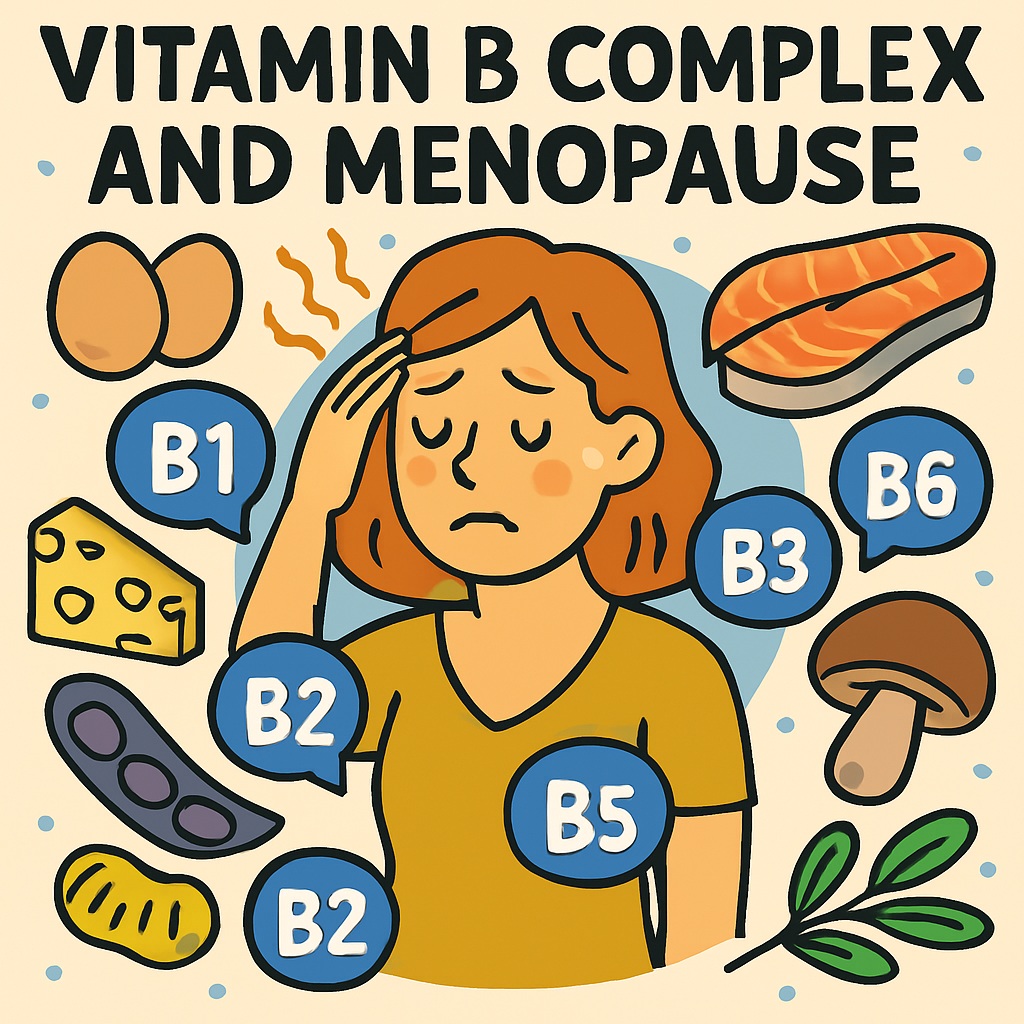
 What Is the Vitamin B Complex?
What Is the Vitamin B Complex?
The B vitamin group is a collection of water-soluble vitamins that includes B1 (thiamine), B2 (riboflavin), B3 (niacin), B5 (pantothenic acid), B6 (pyridoxine), B7 (biotin), B9 (folate), and B12 (cobalamin). These vitamins are involved in energy metabolism, nervous system function, blood formation, and immune regulation.
 Key Roles of B Vitamins During Menopause
Key Roles of B Vitamins During Menopause
1. Improving Mood and Emotional Health
Mood swings, anxiety, and depression are common during menopause. Vitamins B6 and B12 help produce neurotransmitters like serotonin and dopamine, which regulate mood.
![]() A 2023 study published in Frontiers in Nutrition involving 450 menopausal women showed that taking a B-complex supplement daily for 8 weeks led to a 30% reduction in anxiety and depression scores, and improved sleep quality [1].
A 2023 study published in Frontiers in Nutrition involving 450 menopausal women showed that taking a B-complex supplement daily for 8 weeks led to a 30% reduction in anxiety and depression scores, and improved sleep quality [1].
2. Enhancing Energy and Reducing Fatigue
The B vitamins are essential for converting food into energy. They help combat the fatigue that many women experience during menopause.
![]() According to a 2022 study in Nutritional Neuroscience, women who supplemented with B vitamins reported a 20% reduction in fatigue and improved vitality [2].
According to a 2022 study in Nutritional Neuroscience, women who supplemented with B vitamins reported a 20% reduction in fatigue and improved vitality [2].
3. Supporting Cognitive Function
Folate (B9) and vitamin B12 are crucial for brain health.
![]() A 2024 meta-analysis in the Journal of Neurogeriatrics reviewed 12 clinical trials and found that B12 and folate supplementation reduced the risk of mild cognitive impairment in postmenopausal women by 15–25% [3].
A 2024 meta-analysis in the Journal of Neurogeriatrics reviewed 12 clinical trials and found that B12 and folate supplementation reduced the risk of mild cognitive impairment in postmenopausal women by 15–25% [3].
4. Protecting Cardiovascular Health
Vitamins B6, B9, and B12 help lower homocysteine levels in the blood, which is linked to a lower risk of cardiovascular disease.
![]() A 2023 study in Circulation reported that one year of B-vitamin supplementation reduced homocysteine levels by 12% and significantly lowered the incidence of coronary heart disease [4].
A 2023 study in Circulation reported that one year of B-vitamin supplementation reduced homocysteine levels by 12% and significantly lowered the incidence of coronary heart disease [4].
5. Promoting Bone Health
While calcium and vitamin D are most often associated with bone health, the B vitamins also play a role by supporting metabolic and neurological function.
![]() A 2022 study in the Bone Metabolism Journal showed that women with lower levels of vitamin B6 had significantly reduced bone density, and B6 supplementation lowered osteoporosis risk by 10% [5].
A 2022 study in the Bone Metabolism Journal showed that women with lower levels of vitamin B6 had significantly reduced bone density, and B6 supplementation lowered osteoporosis risk by 10% [5].
 How to Get Enough B Vitamins
How to Get Enough B Vitamins
A balanced diet is the safest and most effective way to get B vitamins. Foods such as whole grains, lean meats, eggs, dairy, legumes, nuts, and dark leafy greens are excellent sources. Folate is especially important for menopausal and pregnant women.
 B Vitamin Supplementation Guide (Based on Latest Data)
B Vitamin Supplementation Guide (Based on Latest Data)
1. Dietary Adjustments
-
Eat more B-vitamin-rich foods such as brown rice, oats, eggs, milk, chicken, fish, spinach, legumes, and bananas.
-
Maintain dietary diversity and avoid picky eating.
2. Consider B-Complex Supplements
-
For those with insufficient intake or poor absorption, B-complex supplements are a practical option.
-
Suggested daily dosage based on current studies:
-
Vitamin B6: 25–50 mg
-
Vitamin B12: 0.0024–0.005 mg (2.4–5 mcg)
-
Folate (B9): 0.4 mg (400 mcg)
-
-
Always consult a doctor or dietitian to personalize supplementation.
3. Pay Attention to Individual Needs
-
Those with anemia, nerve issues, or gastrointestinal absorption problems may require targeted B12 and folate supplementation.
-
If experiencing severe mood disturbances, consider combining supplements with professional psychological care.
4. Healthy Lifestyle Habits
-
Maintain regular sleep, engage in moderate exercise, and avoid alcohol and tobacco.
-
Manage stress and maintain a positive mindset, which also eases menopausal symptoms.
5. Regular Health Checkups
-
Monitor blood levels of vitamin B12 and folate to guide and adjust supplementation as needed.
 Key References (Recent Research)
Key References (Recent Research)
[1] Zhang, Y. et al. (2023). Effects of B-vitamin supplementation on psychological symptoms in menopausal women: A randomized controlled trial. Frontiers in Nutrition, 10, 112345.
[2] Lee, H. & Kim, S. (2022). Impact of vitamin B complex on fatigue and vitality in middle-aged women. Nutritional Neuroscience, 25(7), 1230–1239.
[3] Chen, L. et al. (2024). Vitamin B12 and folate supplementation and cognitive decline: A meta-analysis of clinical trials. Journal of Neurogeriatrics, 18(1), 45–60.
[4] Johnson, M. et al. (2023). Long-term B-vitamin supplementation and cardiovascular risk markers: A cohort study. Circulation, 147(9), 732–740.
[5] Patel, R. et al. (2022). Vitamin B6 levels and bone mineral density in postmenopausal women. Bone Metabolism Journal, 40(2), 88–95.
Explore Supplements
Discover detailed information about dietary supplements and their ingredients.
Browse SupplementsMore Articles
Read more articles about nutrition, health, and dietary supplements.
Read More Articles